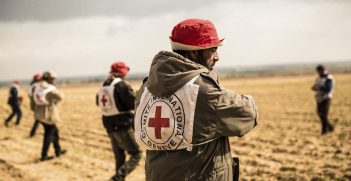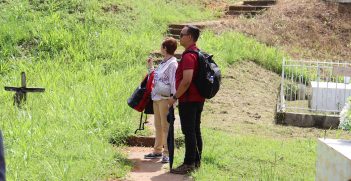Challenges on the Move: Going Missing

With the global number of displaced people at a record high, refugee families are as vulnerable to separation as ever. To mitigate this, the International Committee of the Red Cross is taking innovative steps to help engineer reunifications.
Just before Christmas, Clementina Murcia was reunited with her missing son Mauro, 16 long years after he migrated from Honduras to Mexico. This wonderful outcome is bittersweet as Clementina’s other son Jorge is still missing and she has not had any word of his whereabouts for 31 years.
There are thousands of families like Clementina’s whose loved ones have disappeared while in transit or in destination countries. Not only is the global number of displaced people at a record high, but the International Committee of the Red Cross (ICRC) has registered almost a doubling of new family reunification requests over the last five years. In 2016 alone, 18,000 new cases were opened to search for missing family members.
The suffering of families adds to the humanitarian toll that displacement exacts. Apart from the emotional burden of not knowing whether a relative is dead or alive, families of missing migrants face economic hardships as well as administrative and legal challenges related to property, inheritance, marital status and social benefits. A new website missingmigrants.icrc.org showcases the human stories behind migration statistics to draw attention to the humanitarian consequences of migrants going missing.
People on migration routes are vulnerable to disappearance, whether through losing contact with family members, being detained without contact, or dying on dangerous journeys.
Losing contact
Losing touch with family is a common consequence of displacement, and one that can lead to other difficulties and needs. Some migrants simply lack the resources or know-how to re-establish contact. In some cases, family members are also on the move and are unable to be contacted. Some people may not wish to make contact; this is particularly true for migrants deemed to be irregular by the authorities who thus fear that identifying their location will result in detention or deportation.
The ICRC and National Red Cross and Red Crescent Societies draw on their global network to trace and reunite separated loved ones, and provide services that enable people on the move to resume or maintain contact with their family. Providing access to communication can be as simple as supplying phone-charging and wifi stations along migration routes or portable solar-powered phone chargers at camps. Sometimes migrants need to be aware of their rights and the assistance available to them in order to make the first contact.
Information-exchange platforms are vital for reconnecting people separated on the move. In Europe, the National Red Cross Societies of 28 countries collaborated to establish Trace the Face, a website that publishes photos of people looking for family members believed to have migrated to Europe. The use of photos on this platform, with consent, overcomes some obstacles to tracing such as language barriers, unofficial registrations and name changes.
Detention
Although detention of migrants should be a last resort, many countries of transit or destination adopt a systematic policy of detention. When migrants are not properly registered or are prevented from contact with the outside world, they can effectively disappear. Regardless of their immigration status, people in detention should be treated with dignity, afforded due process of law, and permitted contact with their families or consular officials.
The ICRC visits places of detention around the world and ensures that detainees, including migrants, are able to contact their loved ones should they wish to do so. Along with National Red Cross and Red Crescent Societies, the ICRC relays handwritten messages and provides phone services for detained migrants. Importantly, some migrants do not wish to connect with their family for fear of repercussions on them in the country of origin, so informed consent must be obtained before disclosing their location.
Death
Tragically, many missing migrants are deceased but their fate and whereabouts have not been determined. Of the 350 bodies recovered from the Evros River-crossing in Greece between 2000 and 2017, only a third were identified. Apart from the need to treat the deceased with dignity and respect, it is important that appropriate steps are taken, where possible, to ensure their identification. This is challenging when migrants do not carry personal documents or they are lost or damaged; bodies are in a decomposed state; resources are overwhelmed or prioritised elsewhere; or data from relatives cannot be obtained.
A more significant challenge, however, is the lack of information-sharing between relevant agencies, partly due to different methodologies and policies. For the ICRC, the humanitarian imperative of identifying missing people, including migrants, dictates that identification data is to be used for purely humanitarian purposes of clarifying people’s fate or whereabouts, and not to serve border control or law enforcement functions.
Confirming the death of a loved one is tragic, but at least it brings both emotional and official closure. A death certificate can initiate the grieving process and enable relatives to move on. Recovering the remains or finding the last resting place, though, is not guaranteed as records of their burial may not be available or accurate.
The ICRC has extensive forensic and dead body management experience, and provides assistance to authorities in identifying deceased migrants and burying bodies in a manner that allows identification or location in future. Ensuring traceability of mortal remains grants them dignity and memory, and leaves open the possibility of identification once resources, political will and forensic technologies improve.
Policymakers can take several measures to address these challenges and prevent people on the move from going missing and remaining missing. Migration policies can be nuanced to reduce risks to migrants, states should strengthen their capacity to search for and identify missing migrants, and measures that clarify the legal status of people who are missing will assist the needs of their family members. As migration is a borderless phenomenon, cooperation and coordination between states at regional and international levels is also vital to ensure that people on the move are treated with dignity and can contact their relatives wherever they may be.
Natalya Wells is policy and political affairs officer at the International Committee of the Red Cross Australia Mission.
This article is the first of three from the ICRC examining some of the humanitarian challenges faced by people on the move, be they internally displaced, refugees or migrants, ahead of an upcoming issue of the International Review of the Red Cross.
This article is published under a Creative Commons licence and may be republished with attribution.





